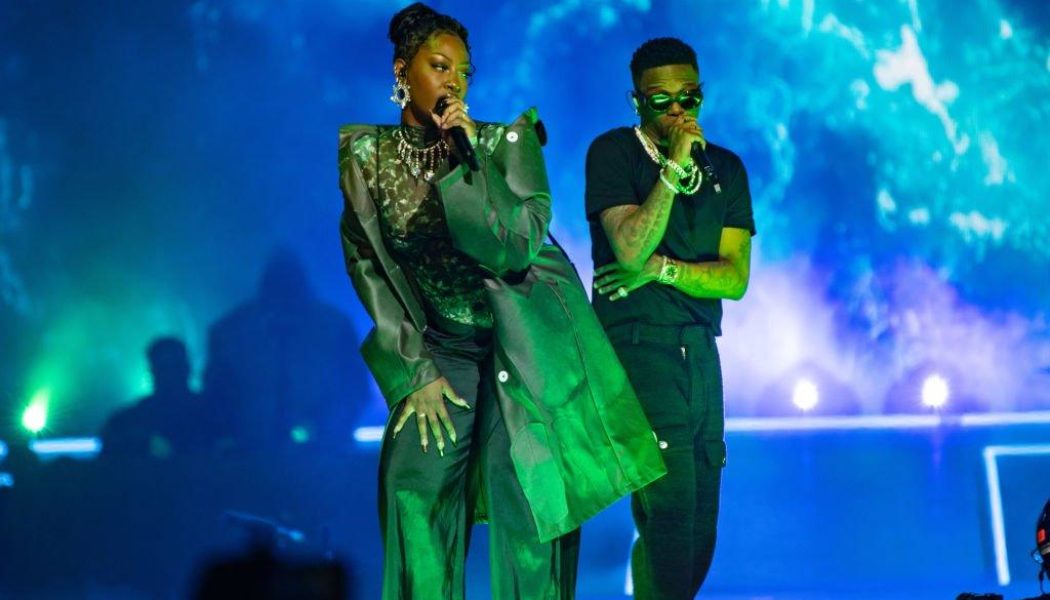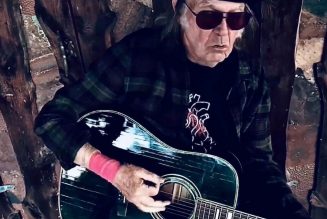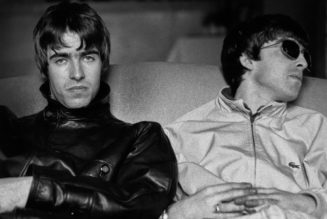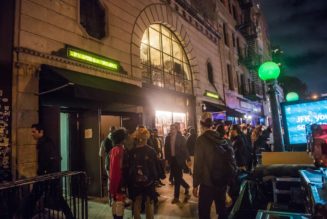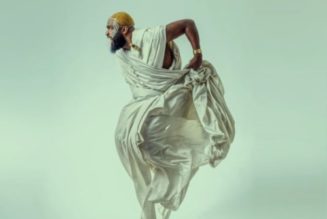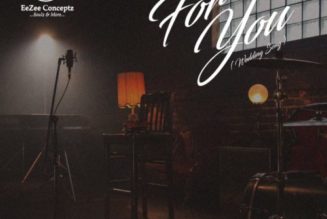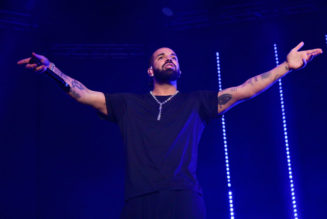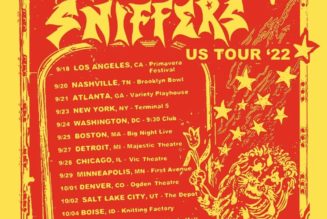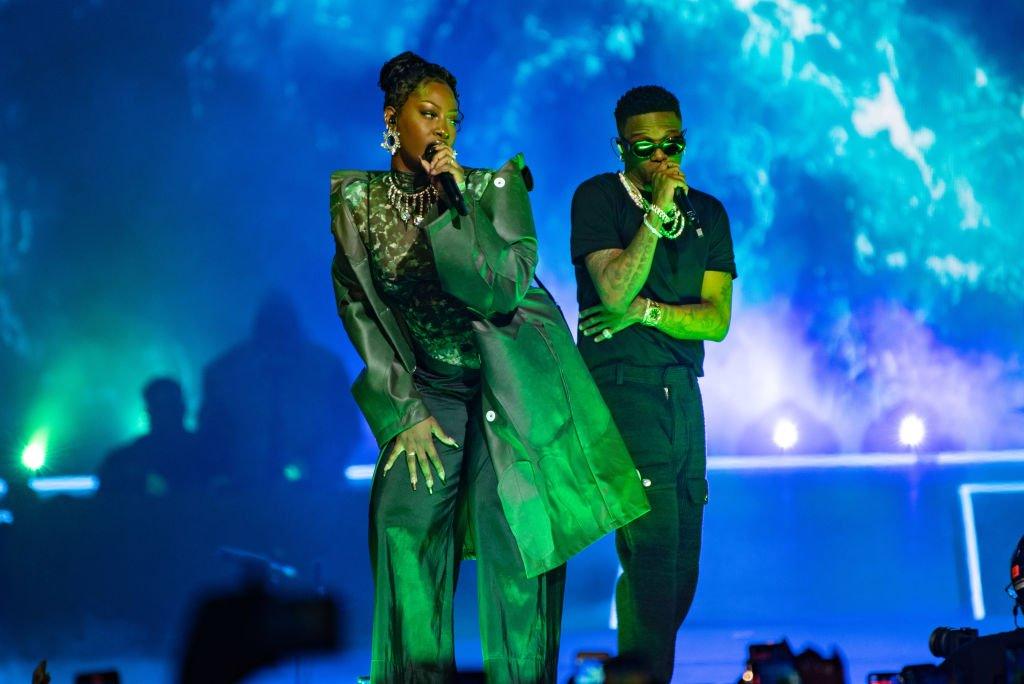
Dancehall artist Teejay has long used alter egos in his breakout performances. Throughout his artistic journey, Teejay has developed a knack for reinventing his image.
First coming on the scene as wunderkind Timoy, Teejay later took on the moniker Buss Head General, a young adult gritty gunman persona, before evolving into joyful melodies as Uptop Boss and later embracing the sensuous realm as Teejay. On I Am Chippy, his debut EP with Warner Music, Teejay sheds his previous layers and embraces yet another cycle of renewal with the alter ego Chippy.
Released Feb. 2, the nine-track I Am Chippy is brimming with infectious melodies and impactful verses. Featuring collaborations with fellow dancehall artists Tommy Lee Sparta, and Bayka on five tracks, I Am Chippy also sees an infusion of Afrobeats with Davido. Throughout, Teejay showcases his vocal mastery against a backdrop of pulsating basslines, eerie synths, Latin guitars, gunshot sounds, and dance-worthy rhythms.
Much like Teejay himself, each track adopts a distinct persona. Lead single “Dip” promises to get everyone moving, as Chippy enthusiastically declares, “Just like how the world did Drift,” his 2023 breakout single that earned him TikTok success, a record deal, and over 78 million plays, everybody is gonna dip for sure.”
Despite these successes — or perhaps because of them — Teejay’s latest alias, Chippy, can’t conceal the chip on his shoulder regarding life’s stark realities. Timoy Janeyo Jones was born into a humble family in Montego Bay, Jamaica, and his musical talent was nurtured by his Christian revivalist mother and two brothers with production skills. By age 9, Teejay was already showcasing his musical prowess within the community, on television, and on the radio. While Teejay seemed destined to become an entertainer, reality took a different turn after he left school in the seventh grade.
“Some of us weren’t meant to be brought up well, go to good schools, learn, and have a proper education. Some of us grew up in the streets and never had fathers,” Teejay reflects. “The EP tells the story of where I’m coming from. Since I was a kid, I wanted to be a star. So that’s the most important thing about it…people can actually listen to it and understand the story of where I came from and where I’m trying to go.
Teejay spoke with GRAMMY.com about his new musical chapter, the nuances of dancehall culture, and his efforts to elevate his dancehall peers into the mainstream.
This interview has been edited for clarity and brevity.
This album and era took a bit of a turn for you. I think some people were used to your songs for the ladies, like “Unfaithful Games,” however, this EP is a bit darker with “gunman chunes.” It’s like you’ve been holding your tongue for so long that now you are showing everyone just how bad you really are.
Reggae music was about peace and love and then came dancehall — it’s been happening since the 1990s with Shabaa Ranks, Bounty Killer, Beenie Man, and Mad Cobra. I was born in ’94, I grew up listening to all these artists so by 2000, that’s all I knew.
The clashing in music, STING [a notorious Jamaican concert where artists lyrically clash], and everything is just culture. Artists go on stage and deejay against each other. This is how we build a fanbase in Jamaica. This is how people know that an artist is lyrically inclined, and to not be played with.
We are not gonna see each other and fight, or anything like that. We’re going to perform together and make some money. It’s all about the bread. It’s just entertainment.
You recently engaged in a clash with another dancehall artist, Valiant. Clashing is a part of dancehall culture; why was doing a clash important to you?
I mean it’s a publicity stunt, right? Both good publicity and bad publicity work sometimes and it has engaged a lot of fans.
I just know how to promote myself. I always wanna be in the front of the class because I wanna learn something so I always practice and know what’s my next move. It’s like playing chess.
Can you share the story behind the transition from your early days in the gritty dancehall scene to today, when you’re blending more diverse styles?
Before “Drift” and “Unfaithful Games,” when Teejay was coming up in Montego Bay, in 2013, it was only grimy dancehall hardcore music. My name was Buss Head General in the beginning and then I decided after some things happened in the past, to grow.
Since I have six kids, I decided to do some good music they can grow up listening to. But I also realized that even the kids love hardcore dancehall songs. I just have to balance the scale.
What’s something signature that every song on the EP has?
Every song on the EP has that new sound. It’s like a new wave. Artists from Kingston and Jamaica always compete for the new sound. Everybody is saying that the Montegonians have the new sound right now, so I’m just trying to get that particular sound out.
Everything has a vibe to it. The 808 is totally different. The melody and the dynamic of everything changed. We took out words from the songs so you can actually feel the melody more with the beat. That’s the craft of it. It’s simple and easy to remember.
Didn’t your mentor Shaggy tell you something about making the words simpler and focusing on amplifying the beat?
Yeah, we went back to the drawing board and changed everything. One of the songs with my son is called “Star.” That’s my favorite song. Everybody is going to sing that song. It’s so understanding! You can hear it clearly and you can understand everything that you sing. It has a melody. It has meaning to it.
You have a lot of features from dancehall artists on the EP; it feels like you’re lighting the way for them.
Yeah, because no man is an island. No man can stand alone. Each one helps the other. So if I can use my platform to enlighten other dancehall artists, at least people will remember that Teejay had his shine and he also brought somebody on the latter with him.
United we stand divided we fall. And I can’t do it alone. I swear I need help. I need other artists in the genre to understand that this is bigger than us. This is a big picture, and if we can just fill in somewhere on the bottom, the top, or in the middle, it would be good for the culture of dancehall and not just for Teejay.
You got signed to Warner Music in 2023. Was getting signed to a U.S. label one of your dreams?
It was always one of my dreams because I’m a lover of music and I realized that people in Jamaica don’t buy EPs — or albums, much less. It’s like time is evolving and people in Jamaica are not evolving with it. They will sit and wait for the YouTube link or something to stream it.
We don’t have proper A&R, we don’t have proper lawyers, but now I have the opportunity to work with these wonderful people, these lovely people, so let’s just do it. Don’t just sit and think about getting the No. 1 trending spot on YouTube in Jamaica. It’s bigger than that. It’s bigger than me. It’s bigger than all of us.
How did the Latin-infused “Twerk” on I Am Chippy come about?
Well, “Twerk” is for the ladies; it was inspired by Busta Rhymes‘ “Put Your Hands Where My Eyes Could See.” It has the same feeling along with [[Santana”Maria, Maria, you remind me of a Westside story.”
That song was produced by DJ Frass Records. Some producers have the experience and the wisdom to know what people want to hear. We were at the Airbnb chilling and he said, “Yo, I have a new rhythm I think you would like.” I said “Run the rhythm, turn it up!” As soon as I heard it, I was like, “Yo this bad, this sick, this crazy! Load it up in the studio!”
I don’t write, I just smoke and drink sometimes and then I just get the inspiration [for a song] based on maybe seeing what a friend or family member is going through. I sing about it so it can feel real.
You dropped out of school in seventh grade to pursue music. That is really young. What do you wish you knew then that you know now?
Honestly, I always wanna learn. Back then, music was the only thing for me. That’s why, now, I make sure that all my kids go to good schools. I tell them that they need their education.
Whenever I’m in a conversation, I try not to say much. I listen to what people say so I can learn or add up things. I read a lot. Most of the time if I’m not doing anything, I try to read a book just to learn something.
I think that I’m far better off than most people who have subjects and degrees. I’m not saying this for kids to feel like, oh, you can do what Chippy did. No, not everybody has the same luck. I never had a father to even help my mom send me to school, so it was pressure for her to see Teejay leave school. But the fact that I didn’t end up in prison or in violence or anything, and I did music and became a big star in the community is good. So I took the negative and turned it into a positive.
You decided to collaborate with Davido on “Drift,” which was a great move. How do you feel about Afrobeats getting some of the mainstream attention that dancehall once had?
I mean, everybody has their time. The reason that dancehall music has taken a backseat, I think, has to do with the people, because music is evolving. [[To be recognized as a supporter of music] you have to have a credit card, a bank account, you have to file taxes, have Zelle, Amazon music, and everything. Nobody in Jamaica subscribes to that, so these are the things that are affecting dancehall music [on the charts]. I think that’s why I am here as an artist promoting dancehall music, telling the people things, and talking to the government about [putting programs in place to support Caribbean music].
For us to say that we feel a way that Afrobeats music has reached where it is, I don’t think is fair. Africa has been putting in the work over the years. I mean, it’s 200 million people in Nigeria alone; like we can’t even compete. [But Afrobeats] was inspired by dancehall music. All these artists from Africa can tell you that they grew up listening to dancehall music: Burna Boy said on a show that he used to listen to Movado, Vybz Kartel, and all these great artists.
And based on the success of your 2023 what was your biggest lesson of the year?
“Drift” taught me a lesson about time. No matter what you do, you have to wait for your time. I swear you cannot beat time. That’s nature.
There was a time when as you mentioned I thought I was a flop. There was a time when I felt nobody was paying Teejay attention. I was giving other people attention and all my time and nobody stopped and even asked me if I was good. So I would just say that’s the most valuable lesson: Believe in yourself, and love yourself before you can love others.
